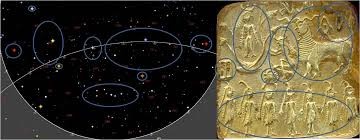Ancient India, renowned for its spiritual wisdom and cultural richness, also held a profound fascination for the celestial realm. Indian astronomy, or “Jyotisha,” has a legacy that stretches back thousands of years. In this article, we embark on a journey through time to unearth the lesser-known but fascinating contributions of ancient Indian astronomers, which continue to captivate us with their scientific ingenuity and cultural significance.
Early Observations and Vedic Connection:
The origins of Indian astronomy are deeply rooted in Vedic texts, where celestial bodies played a pivotal role. The Vedas, the oldest sacred scriptures of India, contain hymns dedicated to celestial objects, highlighting the early reverence for the cosmos. Ancient Indians keenly observed the night sky, integrating celestial movements into religious rituals and agricultural calendars.
Aryabhata’s Pioneering Spirit:
Aryabhata, the luminary of ancient Indian astronomy, is often celebrated for his groundbreaking work in the 5th century CE. His magnum opus, the “Aryabhatiya,” laid the foundation for scientific astronomy in India. Aryabhata’s daring proposal of a heliocentric solar system, centuries ahead of its time, challenged conventional geocentric beliefs and anticipated the revolutionary ideas of Copernicus.
Mathematical Marvels:
Ancient Indian astronomers made remarkable mathematical contributions integral to astronomy. The concept of zero as a numeral, often attributed to the mathematician Brahmagupta, revolutionized mathematics worldwide. Additionally, intricate trigonometric and algebraic methods developed in India greatly advanced the precision of astronomical calculations.
Siddhantas: Treasures of Knowledge:
The Siddhantas, a series of astronomical treatises, delved deep into celestial mechanics. The “Surya Siddhanta,” composed around the 4th century CE, offered precise methods for determining planetary positions and eclipses. These Siddhantas, along with instruments like astrolabes, laid the groundwork for accurate observational astronomy.
Astrology and Cultural Significance:
Astronomy in ancient India was not just a scientific pursuit but also held profound cultural and religious significance. The Vedic astrology system, Jyotisha, emerged from the observation of celestial phenomena and continues to shape Indian cultural practices, including auspicious timing for ceremonies and festivals.
Transcending Borders:
Indian astronomical knowledge transcended geographical boundaries, influencing the Hellenistic world. The Greek astronomer Hipparchus, a pioneer of Western astronomy, is known to have incorporated Indian astronomical concepts into his work.
Modern Endeavors:
India’s fascination with the cosmos endures to this day. The Indian Space Research Organisation (ISRO) has achieved remarkable milestones in space exploration, with missions to the moon (Chandrayaan) and Mars (Mangalyaan), contributing to our understanding of the solar system.
Conclusion: A Celestial Heritage Reimagined:
Ancient Indian astronomy, often overshadowed by other scientific traditions, is a cosmic heritage worth rediscovering. The innovative spirit of Aryabhata and the mathematical brilliance of Brahmagupta continue to inspire us. Beyond the scientific realm, the enduring cultural significance of celestial observation in India reminds us of the deep connections between science, spirituality, and culture. As we revisit the astronomical achievements of ancient India, we uncover a cosmic heritage that enriches our appreciation of the universe and its intricate tapestry of knowledge.


